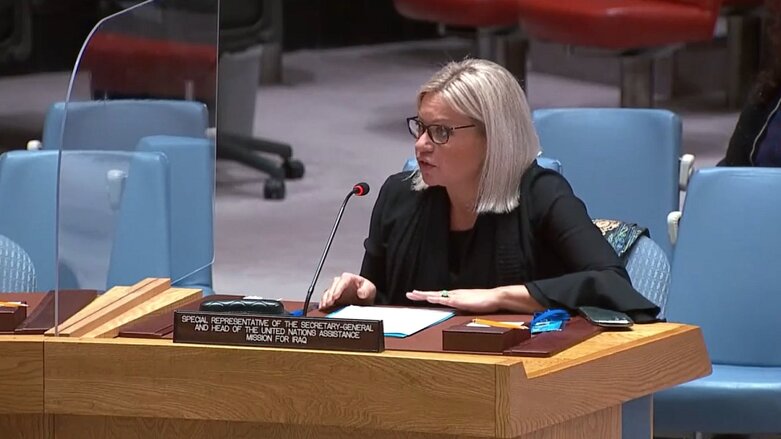UNAMI head discusses Erbil-Baghdad relations at UN Security Council

ERBIL (Kurdistan 24) – Jeanine Hennis-Plasschaert, the head of the United Nations Assistance Mission for Iraq (UNAMI), talked about Erbil-Baghdad relations, Iraqi government formation, and camps in northeast Syria during her briefing to the United Nations Security Council in New York on Thursday.
Speaking on Erbil-Baghdad relations, Hennis-Plasschaert said the importance of “institutionalized dialogue” has only increased. She warned that letting things slide is risky and could lead to potentially far-reaching consequences that would undermine Iraqi stability in both the short and long run.
“I call on all stakeholders to focus on what really matters, to unite instead of competing,” she said. “Efforts should center on resolving outstanding issues. Not by way of a power grab, but in a spirit of partnership and cooperation.”
Iraq is presently facing a prolonged political deadlock over government formation months after the October parliamentary elections. As a result, Hennis-Plasschaert said, “many Iraqis increasingly wonder whether the national interest is actually ‘front and center’ in ongoing negotiations – rather than access to resources and power, or how the pie of political appointments and ministries will be carved this time around?”
She said that Baghdad’s “priority should be to urgently agree on a program of action that – immediately and meaningfully – tackles Iraq’s long list of outstanding domestic business.”
“It’s high time to return the spotlight where it deserves to be: the people of Iraq,” she added.
Hennis-Plasschaert also talked about the worsening environmental and economic challenges facing Iraq.
She warned that Iraq is particularly vulnerable to water scarcity caused by climate change and reduced river inflows and stressed that “shared ownership of this crucial file across the political spectrum will prove essential.”
Iraq’s economy is also running out of time. Hennis-Plasschaert cited an Iraqi official who said some time ago that “even if we had started implementing (the) most urgent reforms the day before yesterday, it will take supra-human efforts to sufficiently address today’s financial, economic and environmental challenges.”
She also called the camps in northeast Syria containing ISIS members ticking time bombs that could have grave implications for the region and even beyond. She warned that keeping people indefinitely restricted in the poor conditions of these camps will ultimately create security risks.
“We should not wait for young children to come of age in a camp like al-Hol,” she said. “These children, living in dire circumstances, never asked to be part of this mess. They find themselves deprived of their rights, at risk of forced recruitment and exposure to violent extremism.”
She added that the fact some ISIS members and their family members have made their way out of some camps “suggests it would be better to control (the situation) and manage returns, rather than take chance of missing them as they slip back – undetected – into any country.”
